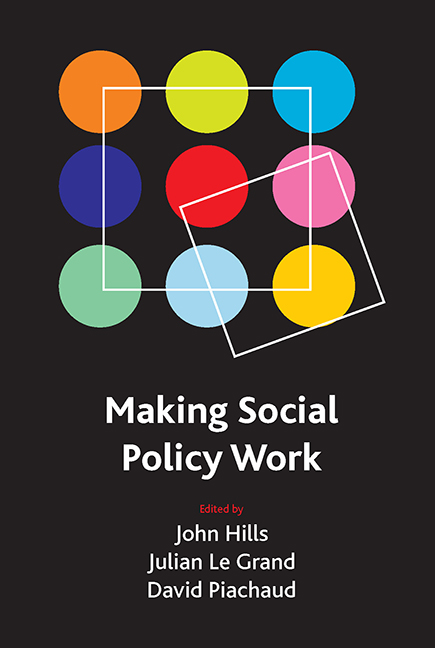Book contents
- Frontmatter
- Contents
- List of tables and figures
- Acknowledgements
- Notes on contributors
- one Introduction
- Part One The aims of social policy
- Part Two Delivering social policy
- Part Three Redistribution: between households; over time; between areas
- Appendix: Bibliography of Howard Glennerster’s publications
- Index
twelve - Distributing resources
Published online by Cambridge University Press: 09 September 2022
- Frontmatter
- Contents
- List of tables and figures
- Acknowledgements
- Notes on contributors
- one Introduction
- Part One The aims of social policy
- Part Two Delivering social policy
- Part Three Redistribution: between households; over time; between areas
- Appendix: Bibliography of Howard Glennerster’s publications
- Index
Summary
The distribution of resources within the British welfare state has a profound effect on the provision of services from place to place and from individual to individual (see Chapter Ten). During the 20th and 21st centuries, British governments and social scientists have debated, evolved and analysed systems of resource distribution that are at least as sophisticated as any used within other developed democracies. As a result of such policy evolution, the research community (if not politicians) in Britain is relatively well equipped to devise and administer distribution systems with particular social or economic objectives.
However, there is evidence that policy towards resource distribution is now changing. The high watermark of equity-driven allocation formulae has almost certainly passed. Having used academic and other research to inform the evolution of such formulae over 40 years, it now appears that other considerations – notably the desire to have smooth and predictable allocations – are beginning to dominate policy making. The implications of a shift from equity-driven resource allocation to a system with flat-rate changes from year to year will be significant.
To understand the changes currently under way, it is necessary to examine the long history of resource allocation mechanisms in Britain. The allocation of resources in local government, the NHS and various sectors within education is a matter of ongoing political interest. The publication of the report of the Lyons Inquiry into local government in March 2007 was a further step along the long road of policy evolution. Howard Glennerster has long been a leading expert in health service resource allocation and has been a member of the NHS Advisory Committee on Resource Allocation.
Background: the evolution of distribution mechanisms
It is impossible to make sense of contemporary resource distribution mechanisms in Britain without an understanding of their history. A book written to celebrate the intellectual contribution of Howard Glennerster is a particularly apt place to consider this history and the place of London School of Economics and Political Science (LSE) within it. A number of the LSE's senior members, from Sidney Webb onwards, have set the terms of the debate concerning the need for universal welfare provision across the country and also of how to secure fair funding of such provision throughout the evolution of the contemporary welfare state.
- Type
- Chapter
- Information
- Making Social Policy WorkEssays in honour of Howard Glennerster, pp. 245 - 264Publisher: Bristol University PressPrint publication year: 2007



